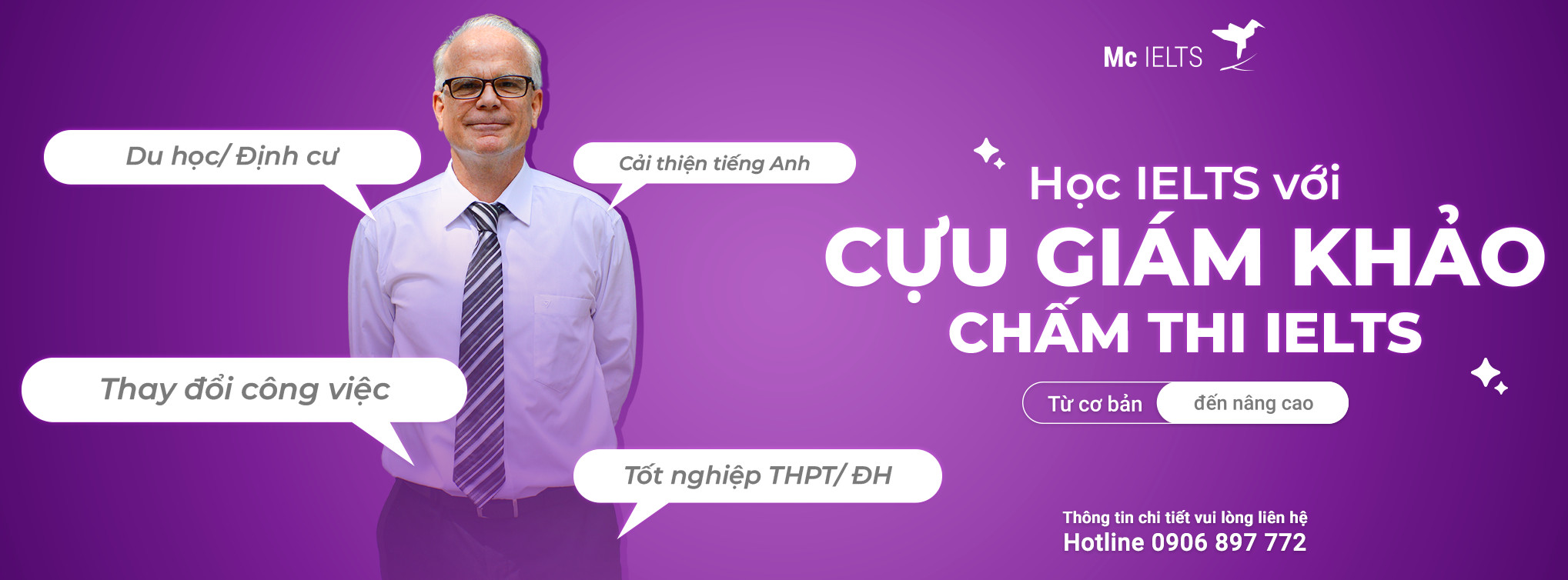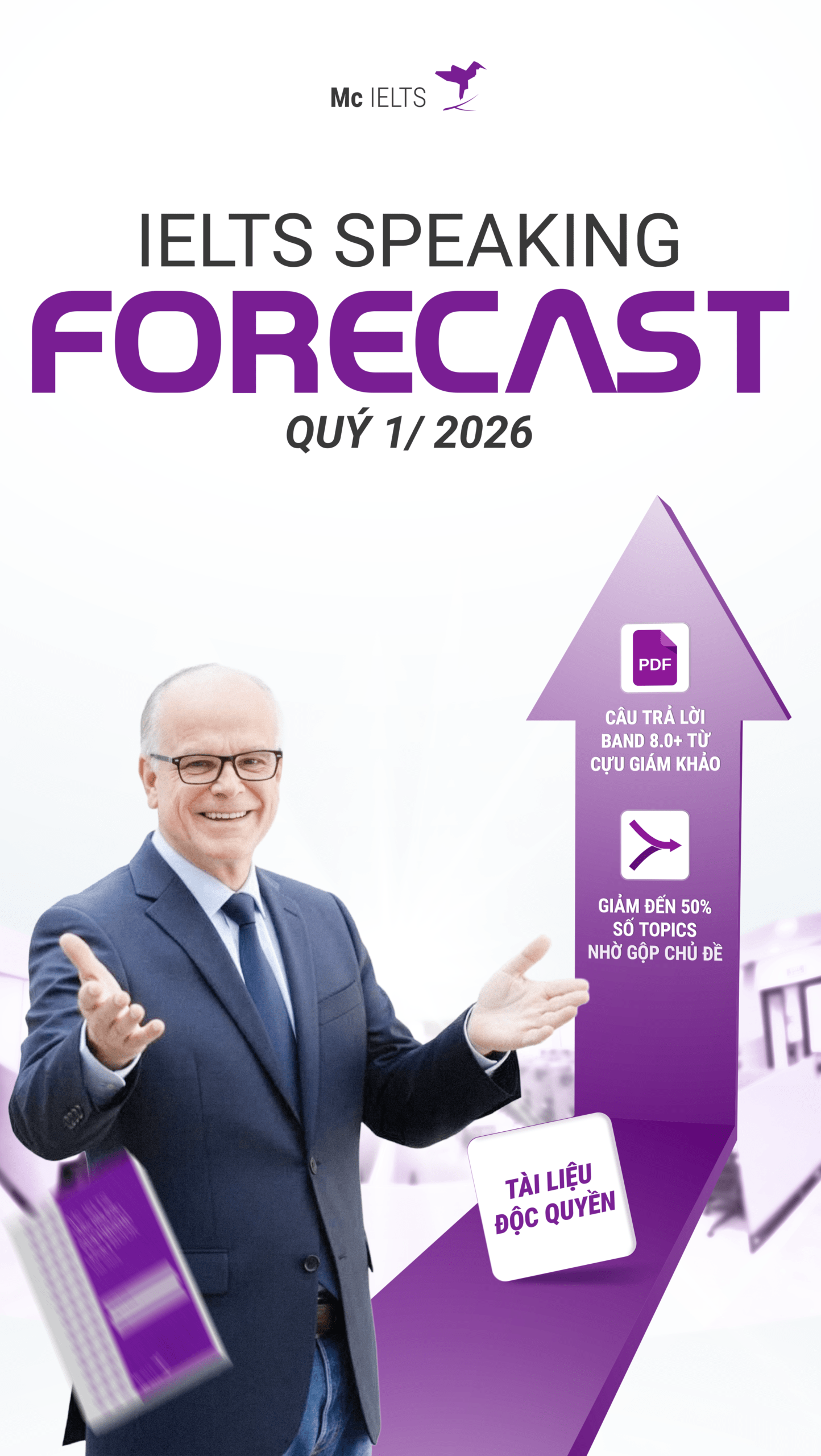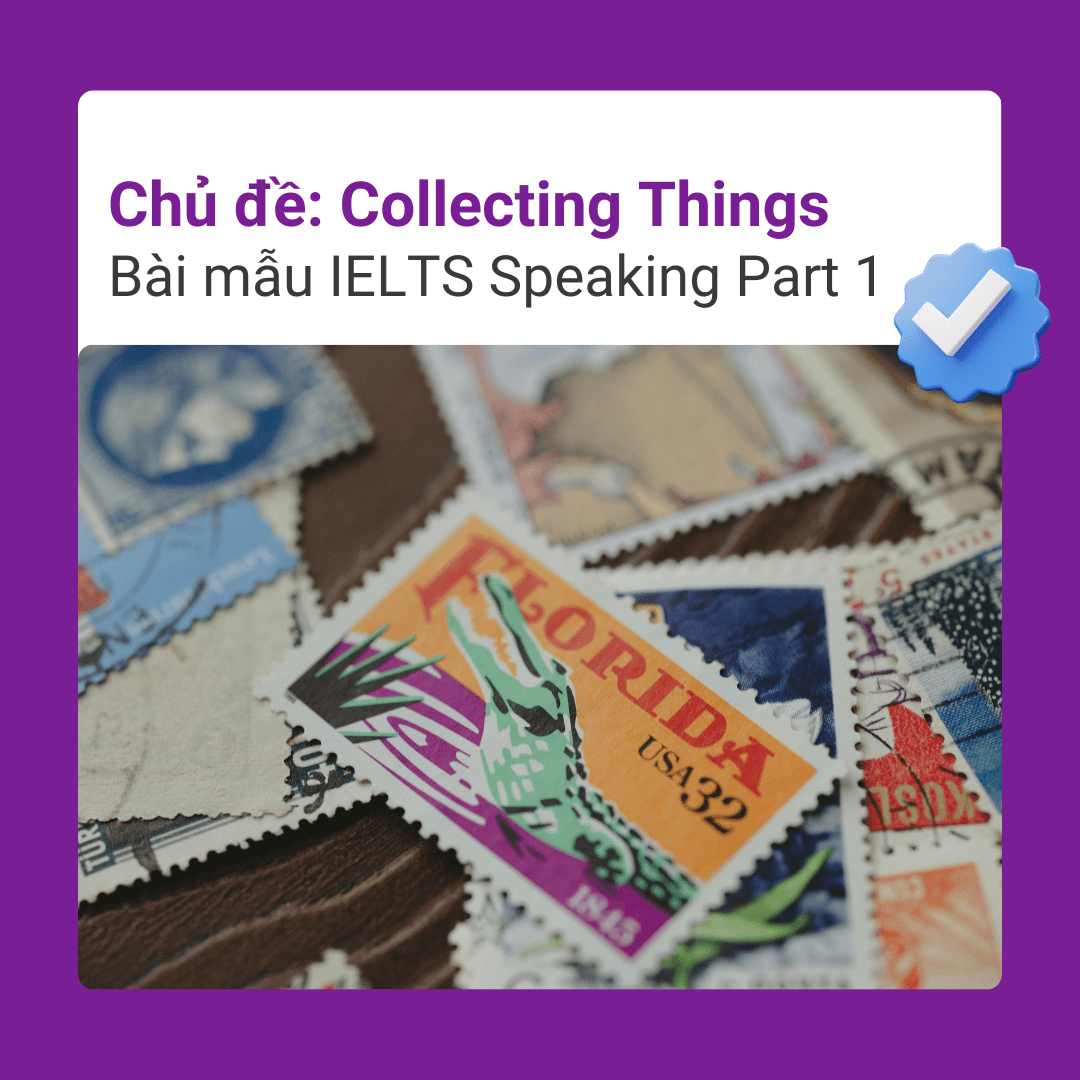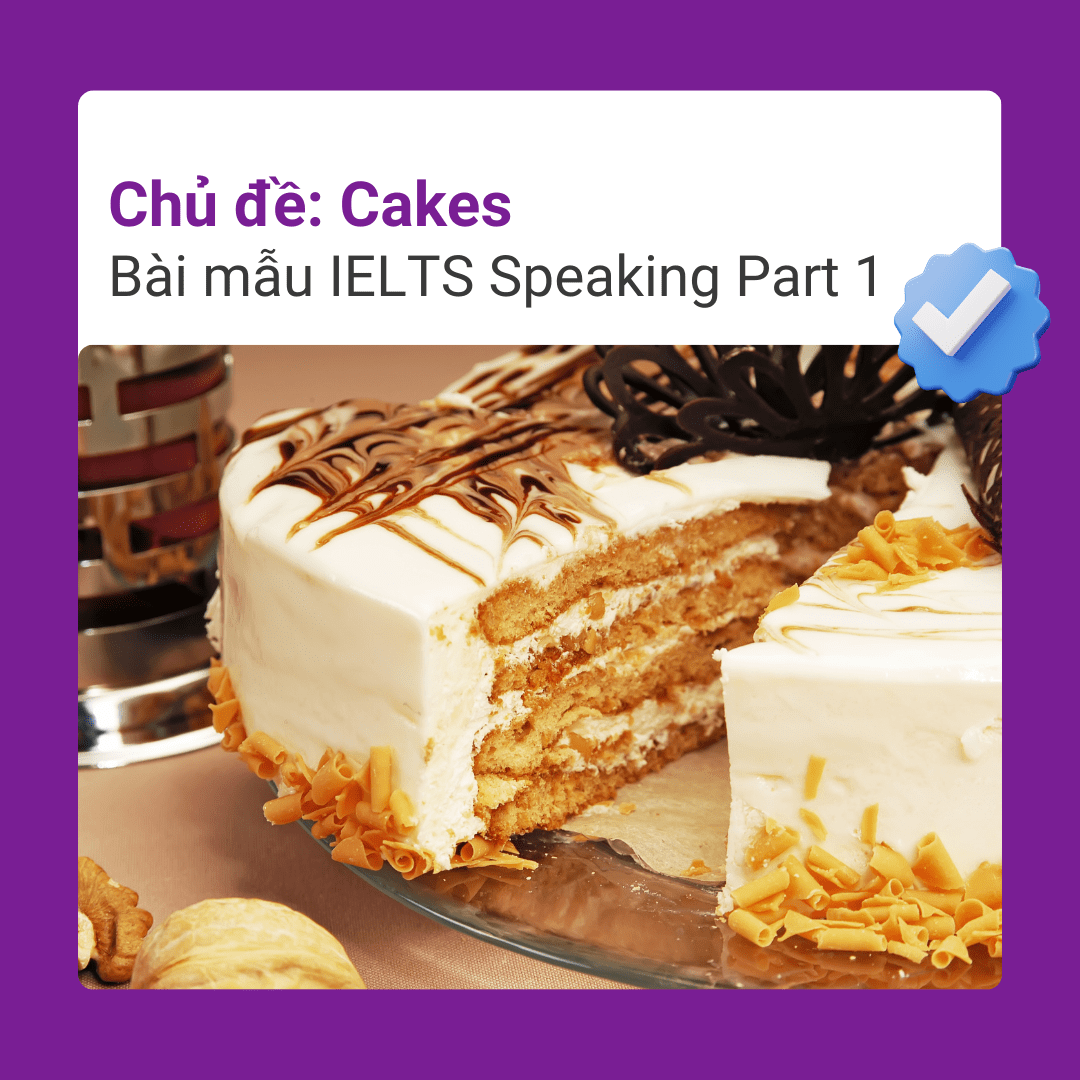IELTS Speaking Part 2 & 3: A Person Who Loves Cooking for Others
 06/03/2025
06/03/2025
 Tác giả : Phong Tran
Tác giả : Phong Tran

A Person Who Loves Cooking for Others
Hướng dẫn trả lời IELTS Speaking Part 2 (Part 2 Answer Guide)
| A person who enjoys cooking for others
You should say:
|
Answer 1
I’d like to describe my grandmother, a person who not only loves cooking but also finds immense joy in feeding others. She’s been a culinary enthusiast all her life and is particularly renowned in our family for her traditional Vietnamese dishes.
My grandmother’s specialty lies in her ability to cook an array of dishes, but her Pho, a Vietnamese noodle soup, is legendary. Every Sunday, she prepares a large family meal where relatives gather to enjoy her cooking. Her kitchen becomes a place of laughter, stories, and the comforting aroma of spices.
What makes her love cooking so much is the happiness it brings to others. She believes food is more than sustenance; it’s a way to express love and to bring people together. Watching her family enjoy her meals gives her a sense of accomplishment and joy. Her passion for cooking and the warmth she adds to every dish make her meals not just delicious but also a symbol of her affection.
Giải nghĩa từ vựng:
Culinary (Adjective)
Định nghĩa: Thuộc về nấu nướng.
Example: She has excellent culinary skills.
Enthusiast (Noun)
Định nghĩa: Người đam mê, người hâm mộ.
Example: He is a sports enthusiast.
Legendary (Adjective)
Định nghĩa: Nổi tiếng, huyền thoại.
Example: The legendary musician inspired many artists.
Aroma (Noun)
Định nghĩa: Mùi thơm.
Example: The aroma of fresh coffee filled the room.
Sustenance (Noun)
Định nghĩa: Thức ăn, chất dinh dưỡng.
Example: Bread is a basic form of sustenance.
Accomplishment (Noun)
Định nghĩa: Thành tựu, thành công.
Example: Graduating from college was a big accomplishment for her.
Affection (Noun)
Định nghĩa: Tình cảm, yêu mến.
Example: He showed his affection by cooking her favorite meal.
Symbol (Noun)
Định nghĩa: Biểu tượng.
Example: The dove is a symbol of peace.
Answer 2
Let me tell you about my friend Alex, a person who adores cooking for others. Alex, a self-taught cook, finds true happiness in the kitchen, experimenting with different cuisines, but he has a soft spot for Italian food.
His lasagna and tiramisu are crowd-pleasers at every gathering. He often cooks for our group of friends, especially during birthdays and special occasions. His kitchen is always buzzing with activity, filled with the scents of herbs and baked goods.
Alex enjoys cooking because it’s his way of showing care and hospitality. He loves the creative process of combining ingredients to create something delicious. For him, the greatest reward is seeing the smiles and hearing the satisfied sighs of friends enjoying his food. His passion for cooking and generosity in sharing his culinary creations make every meal an event to look forward to.
Giải nghĩa từ vựng:
Adores (Verb)
Định nghĩa: Rất yêu thích, mê mẩn.
Example: She adores traveling to new places.
Self–taught (Adjective)
Định nghĩa: Tự học, không qua trường lớp.
Example: He is a self-taught musician.
Crowd–pleasers (Noun)
Định nghĩa: Điều được nhiều người yêu thích.
Example: His jokes are always crowd-pleasers at parties.
Hospitality (Noun)
Định nghĩa: Sự hiếu khách.
Example: They showed great hospitality to their guests.
Creative process (Noun)
Định nghĩa: Quá trình sáng tạo.
Example: The creative process of writing can be very fulfilling.
Generosity (Noun)
Định nghĩa: Sự rộng lượng, hào phóng.
Example: Her generosity in helping others is well-known.
Culinary (Adjective)
Định nghĩa: Thuộc về nấu nướng.
Example: She has excellent culinary skills.
Reward (Noun)
Định nghĩa: Phần thưởng, sự đền đáp.
Example: The smile on the child’s face was reward enough for her efforts.
Hướng dẫn trả lời IELTS Speaking Part 3 (Part 3 Answer Guide)
What do we need to prepare when we need to cook?
Answer 1: Well, firstly, one should have a clear recipe in mind. This helps in organizing the ingredients and equipment needed. Secondly, it’s crucial to ensure all ingredients are fresh and available. Lastly, preparing the cooking area for efficiency, like having a clean workspace and the necessary utensils handy, is important for a smooth cooking process. Additionally, it’s wise to prepare ingredients beforehand by washing, cutting, or measuring them as needed. This method, known as mise en place, streamlines the cooking process. Also, consider safety measures like turning handles of pots inward and keeping a fire extinguisher accessible, especially when cooking with children or in a busy kitchen.
Giải nghĩa từ vựng:
Recipe (Noun)
Định nghĩa: Một bộ hướng dẫn chi tiết cách làm một món ăn.
Example: She followed the cake recipe carefully to ensure it turned out well.
Utensil (Noun)
Định nghĩa: Các công cụ hoặc dụng cụ sử dụng trong việc nấu ăn hoặc ăn uống.
Example: We need to buy some more kitchen utensils like spatulas and ladles.
Mise en place /ˌmiːz ɑːn ˈplɑːs/ (Noun Phrase)
Định nghĩa: Chuẩn bị sẵn sàng các nguyên liệu và dụng cụ trước khi nấu ăn.
Example: A good mise en place ensures a smoother cooking experience.
Fire extinguisher (Noun Phrase)
Định nghĩa: Bình chữa cháy, dùng để dập tắt lửa.
Example: Keeping a fire extinguisher in the kitchen is an important safety measure.
Answer 2: In my view, preparation for cooking begins with a well-thought-out plan. Decide what you want to cook and then gather all the necessary ingredients. It’s also essential to read through the recipe beforehand to understand the steps. And don’t forget to preheat the oven or pans as required – it saves a lot of time. Furthermore, timing is key in cooking, so it helps to set up timers for different cooking stages. Having a clean and organized kitchen can also boost efficiency and make the cooking experience more enjoyable. Remember to keep ingredients that spoil easily, like dairy or meat, refrigerated until they’re needed to maintain freshness.
Giải nghĩa từ vựng:
Preheat (Verb)
Định nghĩa: Làm nóng trước (lò nướng hoặc bếp) trước khi nấu ăn.
Example: The recipe instructed to preheat the oven to 180 degrees Celsius.
Timer (Noun)
Định nghĩa: Thiết bị đo thời gian, thường được sử dụng trong nấu ăn để theo dõi thời gian nấu.
Example: Using a timer helps in managing cooking times effectively.
Refrigerate (Verb)
Định nghĩa: Bảo quản trong tủ lạnh để giữ thực phẩm tươi ngon.
Example: Refrigerate perishable ingredients until they are ready to be used.
Do you agree that food is an important part of Vietnam festivals and ceremonies?
Answer 1: Absolutely, I agree. In Vietnamese culture, food is not just about sustenance but also symbolizes tradition and unity. During festivals, special dishes are prepared which reflect the cultural heritage and bring families together. It’s a way to celebrate, remember the past, and embrace the future. Moreover, these dishes often have symbolic meanings, such as prosperity, health, or good luck, making them integral to the celebratory rituals. The preparation and sharing of food during these times also strengthen familial bonds and community relationships, showcasing the communal nature of Vietnamese culture.
Giải nghĩa từ vựng:
Symbolize (Verb)
Định nghĩa: Đại diện hoặc biểu thị cho cái gì đó, thường là ý nghĩa, ý tưởng hoặc chất lượng.
Example: In many cultures, white doves symbolize peace.
Heritage (Noun)
Định nghĩa: Truyền thống hoặc tài sản văn hóa được truyền lại từ thế hệ này sang thế hệ khác.
Example: The festival celebrates the rich cultural heritage of the community.
Communal (Adjective)
Định nghĩa: Thuộc về cộng đồng, chung cho mọi người.
Example: The communal aspect of food preparation strengthens social ties.
Answer 2: Yes, I concur that food plays a pivotal role in Vietnamese festivals and ceremonies. It’s a form of expression, showcasing the region’s culinary diversity and history. Each dish served during these events carries a story or a specific significance, making them integral to the celebration. Additionally, the act of cooking and eating together during these occasions fosters a sense of community and belonging. It also serves as an opportunity to pass down traditional cooking methods and recipes from older generations to younger ones, preserving the culinary heritage and keeping the cultural identity alive.
Giải nghĩa từ vựng:
Pivotal (Adjective)
Định nghĩa: Cực kỳ quan trọng; có tầm quan trọng quyết định hoặc cơ bản.
Example: His pivotal role in the project led to its success.
Diversity (Noun)
Định nghĩa: Sự đa dạng, sự phong phú trong các phần tử hoặc loại hình.
Example: The festival highlighted the diversity of local cuisine.
Cultural identity (Noun Phrase)
Định nghĩa: Đặc trưng văn hóa tạo nên bản sắc và sự khác biệt của một nhóm hoặc quốc gia.
Example: Food plays a crucial role in maintaining and expressing cultural identity.
Which dishes are a must at festivals?
Answer 1: Typically, at festivals, certain dishes are considered essential. For instance, in many cultures, a form of roasted meat is a centerpiece, symbolizing abundance and celebration. Additionally, sweet dishes like pastries or puddings are common, as they represent happiness and prosperity. These dishes, while varying in different cultures, are often steeped in tradition and hold significant meaning. In some traditions, specific dishes are prepared to honor the history or mythology associated with the festival. Moreover, seasonal fruits and vegetables are often included, reflecting the connection with nature and the cycle of the seasons.
Giải nghĩa từ vựng:
Centerpiece (Noun)
Định nghĩa: Một vật trung tâm, quan trọng nhất trong một sự kiện hoặc tình huống.
Example: The roasted turkey was the centerpiece of the Thanksgiving dinner.
Prosperity (Noun)
Định nghĩa: Tình trạng phồn thịnh, thành công, hoặc sự giàu có.
Example: The festival is celebrated to wish for prosperity and good fortune in the coming year.
Mythology (Noun)
Định nghĩa: Hệ thống các truyền thuyết và câu chuyện dân gian của một dân tộc.
Example: Dishes prepared during festivals often have roots in local mythology and traditions.
Answer 2: At festivals, certain dishes are quintessential. For example, in Asian cultures, rice-based dishes are a must, as rice symbolizes life and fertility. Also, sweet and savory snacks are popular, reflecting joy and the spirit of sharing. These dishes not only add to the festivity but also bring a sense of communal bonding. Many of these dishes are prepared using recipes that have been passed down through generations, embodying the heritage and culinary art of the region. The act of preparing and sharing these dishes during festivals also plays a vital role in strengthening family bonds and community ties.
Giải nghĩa từ vựng:
Quintessential (Adjective)
Định nghĩa: Điển hình, mô tả đúng bản chất hoặc tính cách cơ bản nhất của cái gì đó.
Example: Dumplings are the quintessential dish during the Lunar New Year festival.
Communal (Adjective)
Định nghĩa: Thuộc về hoặc được sử dụng bởi một nhóm người chung; tập thể.
Example: The communal feast brought everyone in the village together.
Culinary art (Noun Phrase)
Định nghĩa: Nghệ thuật nấu ăn, kỹ thuật và kỹ năng chế biến thức ăn.
Example: Traditional festival dishes showcase the culinary art of a region.
Should students learn to cook at school?
Answer 1: Yes, I firmly believe that cooking should be part of the school curriculum. It equips students with essential life skills, such as self-sufficiency and healthy eating habits. Moreover, cooking classes can stimulate creativity and teach students about different cultures through various cuisines. In addition to these benefits, cooking in school can also enhance teamwork and problem-solving skills as students often cook in groups. It also introduces them to the concept of sustainability and the importance of making environmentally conscious food choices.
Giải nghĩa từ vựng:
Curriculum (Noun)
Định nghĩa: Tổng thể các khóa học và chương trình giảng dạy trong một trường học hoặc môn học cụ thể.
Example: The school introduced cooking into its curriculum to promote practical life skills.
Cuisine (Noun)
Định nghĩa: Phong cách hoặc phương pháp nấu ăn đặc trưng cho một quốc gia hoặc khu vực.
Example: Italian cuisine is known for its emphasis on fresh ingredients and simple flavors.
Answer 2: Definitely, learning to cook at school is beneficial. It not only teaches students a vital life skill but also encourages independence. Additionally, it can be a fun, interactive way to learn about nutrition and food science, which are important in today’s health-conscious society. Cooking at school can also foster an appreciation for diverse foods and cultures, broadening students’ horizons. It helps them understand the value of meal planning and budgeting, which are important aspects of independent living. Furthermore, involving students in cooking can nurture a lifelong interest in healthy eating and culinary arts.
Giải nghĩa từ vựng:
Beneficial (Adjective)
Định nghĩa: Có lợi, mang lại ích lợi hoặc lợi ích.
Example: Eating vegetables is beneficial for your health.
Vital (Adjective)
Định nghĩa: Cần thiết cho sự sống, quan trọng, không thể thiếu.
Example: Regular exercise is vital for maintaining good health.
Independence (Noun)
Định nghĩa: Tình trạng tự chủ, không phụ thuộc vào người khác.
Example: Learning to cook boosts a person’s sense of independence.
Food science (Noun Phrase)
Định nghĩa: Lĩnh vực nghiên cứu liên quan đến bản chất của thực phẩm và quy trình chế biến thực phẩm.
Example: Food science classes teach how cooking methods affect the nutritional value of food.
Meal planning (Noun Phrase)
Định nghĩa: Quá trình lập kế hoạch cho bữa ăn, bao gồm việc lựa chọn thực phẩm và chuẩn bị bữa ăn.
Example: Meal planning is an essential skill for managing a healthy diet.
Do you think cooking should be a compulsory or an elective course? Why?
Answer 1: Cooking should be an elective course in schools. While it’s a useful skill, making it compulsory may not suit every student’s interests or future aspirations. Offering it as an elective allows those who are passionate about cooking to explore and develop their skills, without making it a burden for others. Additionally, elective courses allow students to discover and pursue their own interests, which is vital for their personal and academic development. However, basic cooking skills could be integrated into other subjects like science or health education, ensuring that all students have a fundamental understanding of nutrition and meal preparation.
Giải nghĩa từ vựng:
Elective (Adjective)
Định nghĩa: Dựa trên sự lựa chọn, không bắt buộc.
Example: She chose cooking as her elective subject to learn more about culinary arts.
Passionate (Adjective)
Định nghĩa: Có cảm xúc mạnh mẽ hoặc niềm tin sâu sắc.
Example: He is passionate about baking and spends hours perfecting his recipes.
Burden (Noun)
Định nghĩa: Gánh nặng, điều gây phiền nhiễu hoặc khó khăn.
Example: Making cooking compulsory in schools might be a burden for some students.
Academic development (Noun Phrase)
Định nghĩa: Sự phát triển về mặt học thuật, kiến thức và kỹ năng.
Example: Elective courses contribute significantly to students’ academic development.
Nutrition (Noun)
Định nghĩa: Khoa học về cách thức thức ăn ảnh hưởng đến cơ thể.
Example: Understanding nutrition is essential for making healthy food choices.
Answer 2: I believe cooking should be a compulsory course. It’s a fundamental life skill that everyone should possess, irrespective of their career path. Learning to cook promotes a healthier lifestyle and fosters independence, which are essential skills for all young people. Making cooking a compulsory part of the curriculum ensures that every student has the opportunity to learn these vital skills. It also helps students make informed choices about their diet and health, which is increasingly important in a world where processed and fast foods are so prevalent. Lastly, cooking classes can be a platform for teaching other important life skills, such as budgeting, planning, and sustainability.
Giải nghĩa từ vựng:
Compulsory (Adjective)
Định nghĩa: Bắt buộc, không thể tránh khỏi.
Example: In some schools, wearing a uniform is compulsory.
Fundamental (Adjective)
Định nghĩa: Cơ bản, quan trọng nhất, cần thiết.
Example: Understanding basic cooking techniques is fundamental for any aspiring chef.
Foster (Verb)
Định nghĩa: Khuyến khích hoặc phát triển (một cảm xúc, trạng thái, hoặc kỹ năng).
Example: Teaching cooking in schools fosters a sense of responsibility among students.
Are there any differences between cooking today and in the past?
Answer 1: Certainly, there are notable differences between cooking today and in the past. Modern cooking benefits from technological advancements like sophisticated kitchen appliances, which make the process faster and more efficient. Also, today’s globalized world brings a fusion of cuisines, greatly diversifying our food choices. In addition to these changes, the rise of health and dietary awareness has influenced cooking styles, with a greater focus on nutritious and balanced meals. The availability of a wide variety of ingredients, previously uncommon or unavailable, has also expanded the culinary possibilities in home kitchens.
Giải nghĩa từ vựng:
Technological (Adjective)
Định nghĩa: Liên quan đến công nghệ, đặc biệt là khoa học ứng dụng.
Example: Technological advancements have revolutionized the way we cook.
Sophisticated (Adjective)
Định nghĩa: Phức tạp, tinh vi, hoặc cao cấp.
Example: She uses a sophisticated food processor to prepare her meals.
Fusion (Noun)
Định nghĩa: Sự kết hợp của các yếu tố từ các nguồn khác nhau.
Example: The restaurant offers a fusion of Asian and European cuisines.
Diversifying (Verb)
Định nghĩa: Làm cho đa dạng, thêm vào sự phong phú.
Example: Chefs are diversifying their menus to include international dishes.
Culinary possibility (Noun Phrase)
Định nghĩa: Khả năng và tùy chọn trong nấu ăn và chế biến món ăn.
Example: A wide range of ingredients has opened up new culinary possibilities for home cooks.
Answer 2: Yes, cooking today differs significantly from the past. Earlier, cooking was more about traditional methods and recipes passed down through generations. Today, there’s a focus on convenience, speed, and health-conscious choices, like plant-based diets and organic ingredients. Also, the internet has made a vast array of recipes and cooking techniques accessible to everyone. Furthermore, the shift towards sustainable cooking practices, such as reducing food waste and using locally sourced ingredients, reflects a growing environmental consciousness. The role of social media in popularizing certain foods and cooking trends has also added a new dimension to how we perceive and approach cooking.
Giải nghĩa từ vựng:
Traditional (Adjective)
Định nghĩa: Theo phong tục, truyền thống, hoặc phong cách cổ điển.
Example: She enjoys making traditional dishes her grandmother taught her.
Convenience (Noun)
Định nghĩa: Sự dễ dàng và tiện lợi; tính năng làm cho việc gì đó ít rắc rối hơn.
Example: Microwave ovens offer great convenience in heating food quickly.
Plant-based (Adjective)
Định nghĩa: Dựa chủ yếu hoặc hoàn toàn trên thực vật (chủ yếu là thực phẩm không chứa động vật).
Example: Plant-based diets have become increasingly popular for their health benefits.
Accessible (Adjective)
Định nghĩa: Dễ tiếp cận, dễ dàng sử dụng hoặc hiểu.
Example: With the internet, a wide variety of cooking tutorials are now accessible to anyone interested in learning.
Tự tin chinh phục chủ đề “A Person Who Loves Cooking for Others”

Học IELTS cùng Cựu giám khảo www.mcielts.com
Khi đăng ký học IELTS ở trung tâm Mc IELTS, bạn sẽ được hưởng những quyền lợi tuyệt vời:
- Tặng thêm 6 buổi học 1-1 hàng tuần với cố vấn học tập: Để bạn có thể giải đáp mọi thắc mắc và tăng cường luyện tập cá nhân.
- Học lại MIỄN PHÍ nếu không đạt điểm lên lớp: Bạn không cần lo lắng về chi phí khi phải học lại.
- Tham gia nhóm trao đổi Online trên Facebook: Với sự tham gia của cựu giám khảo IELTS, bạn sẽ nhận được những lời khuyên quý báu và phản hồi chi tiết.
- Kho tài liệu IELTS Online phong phú: Hơn 50 đầu sách đa dạng và bổ ích giúp bạn tự học hiệu quả.
- Hỗ trợ học bù và bảo lưu trong quá trình học: Đảm bảo bạn không bỏ lỡ bất kỳ bài học quan trọng nào.
Chất lượng giảng dạy tại Mc IELTS đã được khẳng định qua hơn 1000 đánh giá xuất sắc từ học viên:
- Đánh giá 4.9/5.0 trên Facebook, xem chi tiết tại đây.
- Đánh giá 4.9/5.0 trên Google, xem chi tiết tại đây.
- Đánh giá 9.2/10 trên Edu2review, xem chi tiết tại đây.

Những con số biết nói
Đặc biệt, Mc IELTS còn cung cấp dịch vụ sửa bài miễn phí Writing và Speaking trong nhóm Facebook với sự tham gia của cựu giám khảo IELTS. Đây là cơ hội tuyệt vời để bạn nhận được những phản hồi chi tiết và cải thiện kỹ năng của mình một cách hiệu quả. Tham gia nhóm tại đây.

Tham gia nhóm Facebook của Mc IELTS để được cựu giám khảo chấm chữa bài Speaking và Writing hoàn toàn miễn phí
Qua những câu trả lời mẫu và từ vựng chi tiết trong bài viết này, Mc IELTS hy vọng rằng bạn đã có thêm kiến thức và sự tự tin để đối mặt với chủ đề A Person Who Loves Cooking for Others trong phần thi IELTS Speaking Part 2&3.
Để đạt kết quả tốt nhất trong phần thi Speaking, hãy tham gia các khóa học tại Mc IELTS. Với đội ngũ giảng viên là những cựu giám khảo chấm thi IELTS, Mc IELTS sẽ giúp bạn nâng cao kỹ năng và tự tin chinh phục kỳ thi IELTS. ĐĂNG KÝ NGAY hôm nay để nhận được sự hỗ trợ tốt nhất và chuẩn bị vững chắc cho kỳ thi của bạn.
Nhận lộ trình IELTS TỐI ƯU theo yêu cầu
















